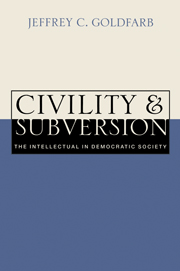Book contents
- Frontmatter
- Contents
- Acknowledgments
- 1 Introduction: the intellectuals at century's end
- 2 Who are the intellectuals?
- 3 The civil intellectual and the public
- 4 The subversive intellectual and the public
- 5 The civil society ideal
- 6 The intellectuals and the politics of culture after communism
- 7 The university
- 8 Race and discursive disruption
- 9 Race and sustained deliberation
- 10 Why is there no feminism after communism?
- 11 Civility and subversion in cynical times
- Notes
- Bibliography
- Index
10 - Why is there no feminism after communism?
Published online by Cambridge University Press: 06 July 2010
- Frontmatter
- Contents
- Acknowledgments
- 1 Introduction: the intellectuals at century's end
- 2 Who are the intellectuals?
- 3 The civil intellectual and the public
- 4 The subversive intellectual and the public
- 5 The civil society ideal
- 6 The intellectuals and the politics of culture after communism
- 7 The university
- 8 Race and discursive disruption
- 9 Race and sustained deliberation
- 10 Why is there no feminism after communism?
- 11 Civility and subversion in cynical times
- Notes
- Bibliography
- Index
Summary
If the intellectual's role is to provoke serious discussion about pressing social problems in public and not to bring truth to the world, as I have maintained, we can recognize the wisdom and limitations of both the civil society and the subaltern position, the importance of civility and subversion. Intellectuals who cultivate a civil public realm do provide the time and the place for deliberations and may reap remarkable fruit, as the experience of East and Central Europeans has demonstrated. These intellectuals, though, must realize that restrictions on deliberations, concerning who can deliberate and about what, may turn the ideal of civil society into its opposite, into a mechanism of constraint, a façade of freedom working to enforce the silencing of subjects (as topics and as people). Yet, the advocates of the silenced subjects should be aware that the speech of the subaltern must be heard and considered in a civil fashion. They must demand their right to speak, but they must convince and not simply declare their position, if democracy is to be practiced. Malcolm X's political position unsupported by a commitment to a free public sphere leads to profoundly undemocratic political positions such as those of Farrakhan and Jeffries. These positions present stark but limited alternatives: Orientalism versus Occidentalism, patriarchy versus matriarchy, one sort of class rule or another, one sort of racial domination or another.
- Type
- Chapter
- Information
- Civility and SubversionThe Intellectual in Democratic Society, pp. 181 - 202Publisher: Cambridge University PressPrint publication year: 1998



